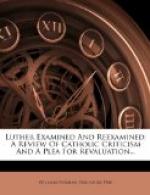Dr. Tholuck, writing on “Luther’s rashness,” says: “What would have become of the Church if the Lord’s servants and prophets had at all times done nothing else than spread salves upon sores and walk softly?” He introduces Luther in his own defense: “On one occasion, when asked by the Marquis Joachim I why he wrote against the princes, he returned the beautiful answer: ’When God intends to fertilize the ground, He must needs send first of all a good thunderstorm, and afterwards slow and gentle rain, and thus make it thoroughly productive.’ Elsewhere he says: ’A willow-branch may be cut with a knife and bent with a finger, but for a great and gnarled oak we must use an ax and a wedge’; and again: ’If my teeth had been less sharp, the Pope would have been more voracious.’ ‘Of what use is salt,’ he exclaims in another passage, ’if it do not bite the tongue? or the blade of a sword unless it be sharp enough to cut? Does not the prophet say, “Cursed be he that doeth the work of the Lord deceitfully, and keepeth back his sword from blood"?’”
One reflection suggests itself in this connection that goes far to exonerate Luther: the language which the Bible employs against heretics and ungodly men. It calls them dogs, Ps. 22, 20; 59, 6; Is. 56, 10; Matt. 7, 6; Phil. 3, 2; Rev. 22, 15; swine, Matt. 7, 6; boars and wild beasts, Ps. 80, 13; dromedaries and asses, Jer. 2, 23f.; bullocks, Jer. 31, 18; bellowing bulls, Jer. 50, 11; viper’s brood, Matt. 3, 7; foxes, Cant. 2, 5; Luke 13, 32; serpents, Matt. 23, 33; sons of Belial, 1 Sam. 2, 12; children of the devil, Acts 13, 10; Satan’s synagog, Rev. 2, 9. As regards its language, the Bible, too, agrees with the conditions of the times in which it was written. When God, to express His righteous anger, addresses the ungodly in such terms of utter contempt, He teaches us how to regard them and, on occasion, to speak of them. This “coarse” Luther is not more vehement and repulsive in his speech than the holy Word of God.
We remarked before that we would not apologize for Luther’s rashness and coarse speech. Luther’s acts are self-vindicating; they will approve themselves to the discriminating judgment of every reader of history. We can appreciate this sentiment of McGiffert : “As well apologize for the fury of the wind as for the vehemence of Martin Luther.” The Psalmist calls upon the forces of nature: “Praise the Lord, fire, and hail; snow and vapors; stormy wind fulfilling His word.” (Ps. 148, 7. 8.) God has a mission that our philosophy does not fathom for the mad hurry and destruction of the whirlwind. How silly it would be to criticize a cyclone because it is not a zephyr! We can imagine a scene like this: The battle of Gettysburg is in progress and a gentle lady is permitted to see it from a distance by a grim, warlike guide, and the following conversation ensues:
“Why, they are shooting at each other! Did you see that naughty man stab the pretty soldier right through his uniform?”




